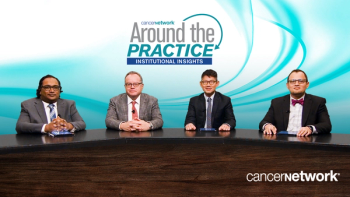
Myeloma specialists discuss considerations they consider when determining how they sequence CAR T-cell therapies and bispecific antibodies.

Your AI-Trained Oncology Knowledge Connection!


Myeloma specialists discuss considerations they consider when determining how they sequence CAR T-cell therapies and bispecific antibodies.
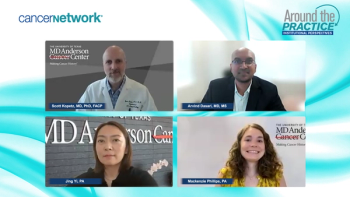
Panelists analyze observed obstacles to implementing routine circulating tumor DNA testing as a standard of care, while offering strategies to overcome these challenges.

Panelists explore the clinical value of circulating tumor DNA testing at various stages of the colorectal cancer treatment journey, with a focus on optimal testing timelines.
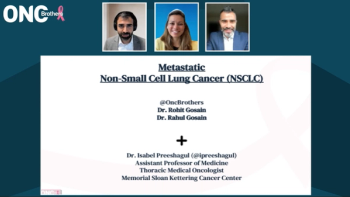
The Oncology Brothers and Isabel Preeshagul, DO, MBS, share clinical insights on later-line treatment practices for patients with metastatic non–small cell lung cancer.

Isabel Preeshagul, DO, MBS, and the Oncology Brothers discuss the treatment of patients with NSCLC and actionable mutations following progression on first-line therapy.

Medical oncologists discuss the role of dual checkpoint inhibitors with chemotherapy in the treatment of patients with metastatic non–small cell lung cancer.

Isabel Preeshagul, DO, MBS, joins the Oncology Brothers, Rahul Gosain, MD, and Rohit Gosain, MD, to discuss treatment practices for newly diagnosed patients with metastatic non–small cell lung cancer (NSCLC) and no actionable mutations.
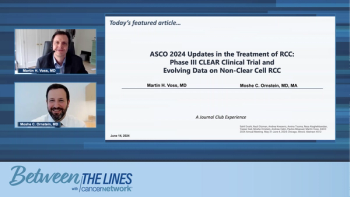
Medical experts compare the updated results of a Phase II trial and KEYNOTE B-61, both presented at ASCO 2024, giving a comprehensive overview of these pivotal studies.

The panel examines the key findings from abstract 4512 and evaluates its potential impact on the current treatment paradigm for renal cell carcinoma.
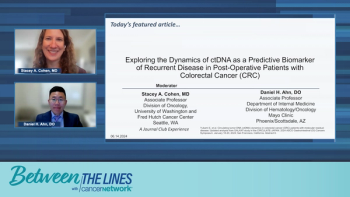
Colorectal cancer specialists review recent updates from BESPOKE-CRC evaluating the utilization of circulating tumor DNA for informing adjuvant therapy in patients with colorectal cancer.

Medical oncologists discuss whether ctDNA clearance can serve as an acceptable surrogate end point in the treatment of patients with colorectal cancer.
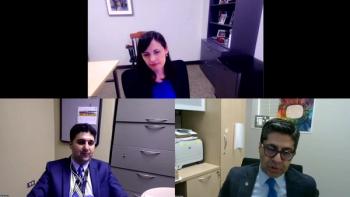
Experts from Vanderbilt University Medical Center emphasize gathering a second opinion to determine if a tumor is resectable in patients with pancreatic cancer.

Following ASCO 2024, Samer Al'Hadidi, MD, discusses recent updates from the PERSEUS trial evaluating the role of testing for minimal residual disease (MRD) in guiding treatment for relapsed/refractory multiple myeloma.

Experts on multiple myeloma provide comprehensive insights on treatment spacing and step-up dosing practices and discuss the long-term utilization of bispecific antibodies.
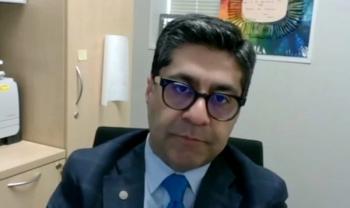
Experts from Vanderbilt University Medical Center discuss the use of intraoperative radiation therapy in a 64-year-old patient with pancreatic cancer.
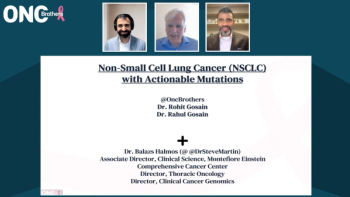
Balazs Halmos, MD, and the Oncology Brothers discuss therapeutic practices for patients with NSCLC, highlighting how MET exon 14 skipping mutations and RET rearrangements inform treatment decisions.

The Oncology Brothers and Balazs Halmos, MD, provide clinical insights on therapeutic options for patients with NSCLC with rare mutations, including ROS1, BRAF V600E, and NTRK.

Medical oncologists discuss therapeutic practices for patients with non–small cell lung cancer with ALK mutations.

A thoracic medical oncologist provides insights on the treatment of patients with non–small cell lung cancer with uncommon EGFR mutations.

Key opinion leaders evaluate the selection of available assays and platforms in relation to specific clinical objectives.

Medical experts examine how recent data on circulating tumor DNA-based minimal residual disease testing may impact the clinical management and treatment of colorectal cancer.

Balazs Halmos, MD, joins the Oncology Brothers, Rahul Gosain, MD, and Rohit Gosain, MD, to discuss the treatment algorithm for patients with non–small cell lung cancer (NSCLC) with common sensitizing EGFR mutations.

Medical experts in renal cell carcinoma provide an overview of abstract 4512 presented at ASCO 2024.

The expert panel explores predictors of chromophobe renal cell carcinoma recurrence and other critical factors that inform treatment decisions for patients.

Although no responses were observed in 11 patients receiving abemaciclib monotherapy, combination therapies with abemaciclib may offer clinical benefit.

Daniel H. Ahn, DO, and Stacey A. Cohen, MD, engage in a comprehensive discussion on recent findings from the GALAXY study in CIRCULATE-Japan.

Experts on colorectal cancer share insights on optimizing the frequency of ctDNA detection and discuss potential ways to overcome challenges associated with MRD detection.
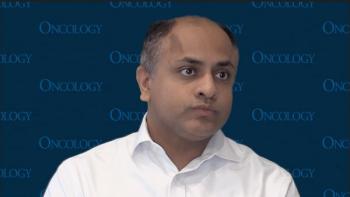
Findings show no difference in overall survival between various treatments for metastatic RCC previously managed with immunotherapy and TKIs.
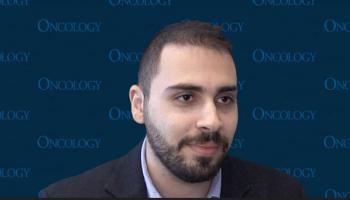
An epigenomic profiling approach may help pick up the entire tumor burden, thereby assisting with detecting sarcomatoid features in those with RCC.

The expert panel shares clinical insights on sequencing CAR T-cell therapies and bispecific antibodies for patients with relapsed/refractory multiple myeloma.